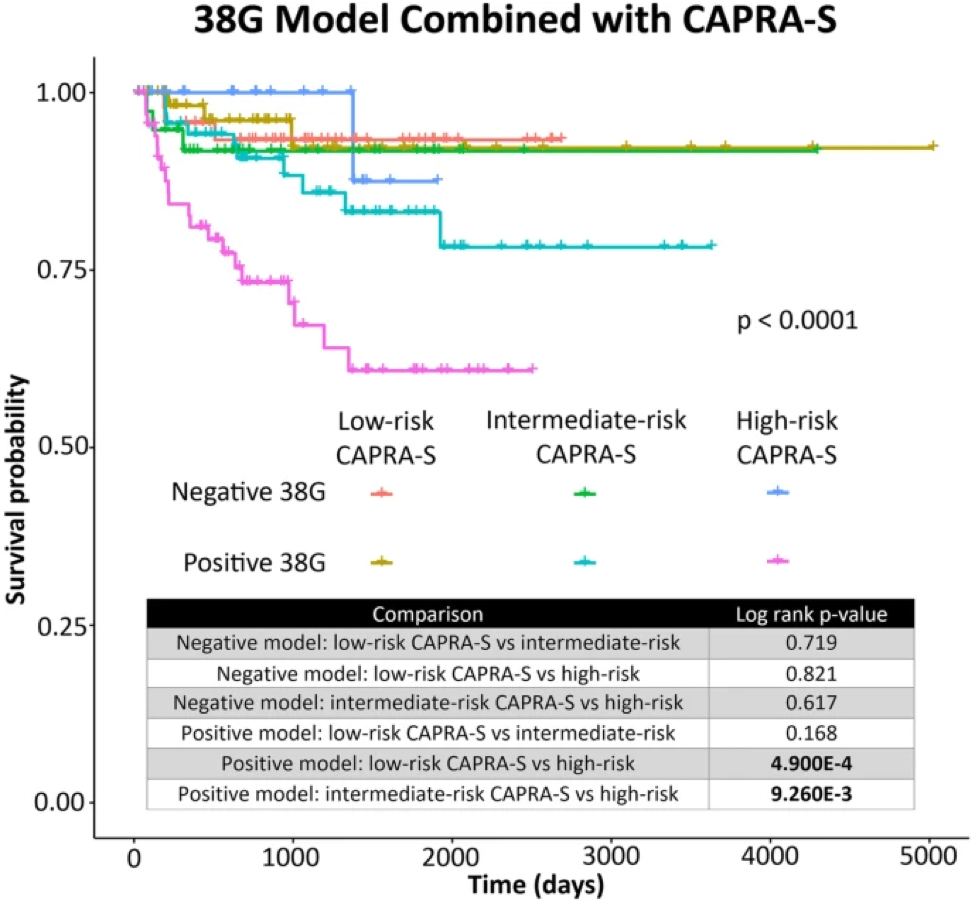In prostate cancer, loss of the TET2 gene in particular has been linked to aggressive disease and worse cancer-specific survival in patients.1 In our previous study of TET2-deficient prostate cells, we identified seven high-confidence TET2-target genes which exhibited expression loss and methylation gain in promoters.2 Expression of these genes was able to significantly discriminate between recurrent and non-recurrent prostate tumors, showing that TET2-mediated gene dysregulation could be useful for disease prognostication.
Biochemical recurrence is often used as a prognostic measure of outcome in prostate cancer, and often exhibits a response prior to evidence of clinical progression in the patient. Early treatment of patients with biochemical recurrence is associated with a lower incidence of metastasis and has a positive impact on mortality.3 As such, identification of biomarkers that can predict whether or not a patient will exhibit biochemical recurrence after surgery may influence treatment decisions and improve patient outcomes.
In this study,4 we examined 1122 TET2-associated genes, using random forest-based recursive feature elimination on a training cohort of 100 patients to identify an optimal 38-gene model associated with biochemical recurrence. Validation of our 38-gene model in the independent TCGA (The Cancer Genome Atlas, n=423) cohort showed that positive model status was associated with increased risk of biochemical recurrence, with a 93.9% probability that patients with a negative result would not go on to experience a biochemical recurrence event after radical prostatectomy.
To determine whether this model could add any utility to current risk classification systems, we assessed the 38-gene model alongside the post-surgical UCSF Cancer of the Prostate Risk Assessment (CAPRA-S) score, which has outperformed other risk classification criteria for prediction of recurrence, metastasis, and cancer-specific mortality. Intriguingly, we found that 38-gene model status was independently associated with higher risk among patients experiencing partial remission or progressive disease on patient follow-up as compared to complete remission.
Approximately 20% of CAPRA-S high-risk group patients do not exhibit cancer progression within a 5-year period after surgery.5 Importantly, our research shows that the 38-gene model adds significant discriminatory power to the CAPRA-S high-risk group (shown below). Patients with high-risk CAPRA-S scores who had negative 38-gene model status did not differ significantly in terms of the outcome from those who were classified as low-risk by CAPRA-S. As such, the 38-gene model shows potential in identifying those patients who are truly high-risk and would benefit from early treatment, differentiating from those who are at low-risk for recurrence.
Future studies will aim to examine this model in other, independent cohorts. In the context of prognostic utility, such studies will allow us to confirm the additive ability of our model to CAPRA-S; in the context of biology, these findings will help to further illuminate the link between TET2-associated genes and high-risk outcomes in prostate cancer.
Results - Figure

Figure adapted from BMC Cancer [3] under the terms of the Creative Commons Attribution 4.0 International License (http://creativecommons.org/licenses/by/4.0/)
Written by: Shivani Kamdar1,2 & Bharati Bapat1,2
- Lunenfeld-Tanenbaum Research Institute, Sinai Health System, Toronto, ON, Canada
- Department of Laboratory Medicine and Pathobiology, University of Toronto. Medical Sciences, Toronto, ON, Canada
References:
- Takayama K, Misawa A, Suzuki T, et al. TET2 repression by androgen hormone regulates global hydroxymethylation status and prostate cancer progression. Nat Commun. 2015;6:8219.
- Kamdar S, Isserlin R, Van der Kwast T, et al. Exploring targets of TET2-mediated methylation reprogramming as potential discriminators of prostate cancer progression. Clin Epigenetics. 2019;11(1):54.
- Artibani W, Porcaro AB, De Marco V, et al. Management of Biochemical Recurrence after Primary Curative Treatment for Prostate Cancer: A Review. Urologia internationalis 2018;100: 251-262.
- Kamdar, S., Fleshner, N.E. & Bapat, B. A 38-gene model comprised of key TET2-associated genes shows additive utility to high-risk prostate cancer cases in the prognostication of biochemical recurrence. BMC Cancer 2020; 20:953.
- Cooperberg, M.R., Hilton, J.F., & Carroll, P.R. The CAPRA-S score: a straightforward tool for improved prediction of outcomes after radical prostatectomy. Cancer 2011; 117(22): 5039-5046.
Read the Abstract


